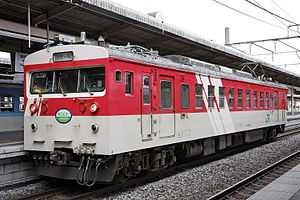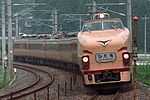123 series
| 123 series | |
|---|---|
 JR East KuMoHa 123-1, May 2008 | |
| In service | 1986– |
| Manufacturer | JNR, JR Central |
| Constructed | 1986–1988 |
| Number built | 13 |
| Number in service | 5 |
| Number scrapped | 7 |
| Formation | Single car |
| Operator |
JNR (1986-1987) JR East (1987-2013) JR Central (1987-2007) JR West (1987-Present) |
| Specifications | |
| Car body construction | Steel |
| Doors | 2/3 per side |
| Traction system | Resistor control |
| Electric system(s) | 1,500 V DC |
| Current collection method | overhead catenary |
| Safety system(s) | ATS-P, ATS-Ps |
| Track gauge | 1,067 mm (3 ft 6 in) |
The 123 series (123系) is a single-car electric multiple unit (EMU) train type introduced in 1986 by Japanese National Railways (JNR), and later operated by East Japan Railway Company (JR East), Central Japan Railway Company (JR Central), and West Japan Railway Company (JR West).[1]
Overview
The 123 series was created in 1986 from former KuMoNi 143 baggage cars which had become surplus to requirements. Some units were also converted from KuMoYuNi 147 postal cars (123-40 series, later 123-5000 series), and from KuMoYa 143 tractor cars (123-600 series).[1][2]
Operations
As of 1 April 2012, one 123 series car (KuMoHa 123-1) is operated by JR East, based at Matsumoto Depot for use on the Chuo Main Line and Shinonoi Line.[3] Five 123 series cars (KuMoHa 123-2 to 6) are operated by JR West on the Ube Line, Onoda Line, and Sanyo Main Line.[3]
Variants
KuMoHa 123-1
This car was converted from former baggage car KuMoNi 143-1 at Nagano Works in October 1986.[1] It was reliveried in March 1990 following conversion to wanman driver only operation.[1]
-

JR East KuMoHa 123-1 "Mini Echo", March 2008
KuMoHa 123-2 to 4
These three cars were converted in February 1987 at Hiroshima Works from former baggage cars KuMoNi 143-2, 3, and 6, respectively, originally for use on the Kabe Line.[1] The two original pantographs were replaced with one PS16J lozenge-type pantograph at the No. 1 end.[1]
-

JR West KuMoHa 123-3, October 2006
KuMoHa 123-5 to 6
These two cars were converted in April 1987 at Suita Works from former baggage cars KuMoNi 143-7 and 8, respectively, originally for use on Hanwa Line branch services.[1] The original pantographs at the No. 1 end were removed on conversion.[1]
-

JR West KuMoHa 123-6, October 2006
KuMoHa 123-41 –
These cars were converted in January 1987.[1]
-

JR Central KuMoHa 123-42 in original Minobu Line livery, May 1989
KuMoHa 123-601 to 602
These two cars were converted in March 1988 by JR Central at Hamamatsu Works from former tractor cars KuMoYa 143-601 and 602, respectively, for use on the Minobu Line.[1] These cars had gangway doors at the ends, three sliding doors per side, and two pantographs.[1] Inverter-controlled air-conditioning was added in December 1988.[1]
-

JR Central cars KuMoHa 123-601 and 602, February 2006
KuMoHa 123-5041 –
These cars were modified in June 1989 at Hamamatsu Works by JR Central from earlier KuMoHa 123-40 series cars, with the addition of inverter-controlled air-conditioning.[1]
-

JR Central KuMoHa 123-5041, May 2003
-

JR Central KuMoHa 123-5042, September 2006
KuMoHa 123-5145 –
These cars were modified by JR Central from earlier KuMoHa 123-40 and KuMoHa 123-5040 series cars, for use on wanman driver only operation services on the Minobu Line. Gangway doors were also added on conversion.[1]
-

JR Central KuMoHa 123-5145, October 2003
History
The last remaining 123 series car operated by JR East is scheduled to be withdrawn from the start of the revised timetable on 15 March 2013, with operations replaced by E127 series 2-car EMUs.[4]
References
- ↑ 1.0 1.1 1.2 1.3 1.4 1.5 1.6 1.7 1.8 1.9 1.10 1.11 1.12 1.13 JR全車輛ハンドブック'92 [JR Rolling Stock Handbook 1992]. Japan: Neko Publishing. 1992. p. 181-182.
- ↑ Haraguchi, Takayuki (2009). Encyclopedia of JR's Railway Cars: JR全車輌. Japan: Sekai Bunka. p. 75. ISBN 978-4-418-09905-4.
- ↑ 3.0 3.1 JR電車編成表 2012夏 [JR EMU Formations - Summer 2012]. Japan: JRR. May 2012. p. 101/197. ISBN 978-4-330-28612-9.
- ↑ "2013 年3 月ダイヤ改正について" [March 2013 Timetable Details] (pdf). News Release (in Japanese). Japan: East Japan Railway Company Nagano Branch. 21 December 2012. p. 3. Retrieved 3 January 2013.
External links
| Wikimedia Commons has media related to JNR 123. |
- JR East 123 series (Japanese)
| |||||||||||||||||||||||||||||
| |||||||||||||||||||||||||||||
| |||||||||||||||||
| |||||||||||||||||||||||



